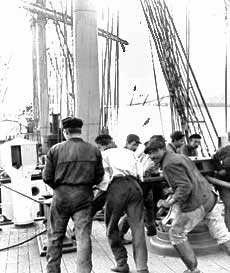Melville introduces Billy Budd as a pure, innocent, boy-like man in order to create a window into the harsh world of the eighteenth century British Navy. Everything about him is opposite of his shipmates. He is uncommonly beautiful, so much so that people would assume he is much younger than he is. Also, he is a foundling of probably wealthy heritage. This too separates him from the common sailor. He is kind and carry’s no grudges. In short, his is simple and innocent.
Billy’s character is like an obedient child among a den of thieves. Literally, most of crew were probably criminals. During the time period in which this is set, the British Navy was short of hands. They resorted to impressing anyone and when that didn’t work they would draft from the jails.
In the case of a warship short of hands whose speedy sail was imperative, the deficient quota, in lack of any other way of making it good, would be eked out by drafts culled direct from the jails (Melville, pg. 35).
The average person is not going to relate to criminal, so Melville creates a character that juxtaposes these hard creatures. Even the captain, who himself is no criminal, is distanced from Billy by his education and cold demeanor.
In the scene where Captain Vere has Claggart confront Billy, Vere urges Billy to stand up for himself by yelling at him. Billy frozen in frozen in horror cannot speak because of his stutter. As a simple person, in this situation, without words, all he has left is action. Again the contrast of Captain Vere and Claggart as speakers and Billy as silent show how separate he is from everyone else on the boat. While another sailor in his situation might have done the same thing, they would have done it for a different reason. A common sailor might have struck Claggart out of anger or revenge. Billy did not.
All of these differences lead the audience to seeing the story of Billy Budd from the point of view of an innocent. In many ways the general audience of the book are also innocents. They did not live on a Navy ship in the late 1700s nor have they ever felt the same conditions or constrictions of a life during that time. A character such as Billy Budd, gives the audience a way to experience the harshness of the situation without feeling thrust into the unknown.
This is a rough draft in many ways. I could especially use help with the flow. Also, any other examples of Billy contrasting with the rest of the characters I could reference would be helpful.
